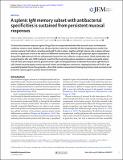A splenic IgM memory subset with antibacterial specificities is sustained from persistent mucosal responses
Abstract
To what extent immune responses against the gut flora are compartmentalized within mucosal tissues in homeostatic conditions remains a much-debated issue. We describe here, based on an inducible AID fate-mapping mouse model, that systemic memory B cell subsets, including mainly IgM+ B cells in spleen, together with IgA+ plasma cells in spleen and bone marrow, are generated in mice in the absence of deliberate immunization. While the IgA component appears dependent on the gut flora, IgM memory B cells are still generated in germ-free mice, albeit to a reduced extent. Clonal relationships and renewal kinetics after anti-CD20 treatment reveal that this long-lasting splenic population is mainly sustained by output of B cell clones persisting in mucosal germinal centers. IgM-secreting hybridomas established from splenic IgM memory B cells showed reactivity against various bacterial isolates and endogenous retroviruses. Ongoing activation of B cells in gut-associated lymphoid tissues thus generates a diversified systemic compartment showing long-lasting clonal persistence and protective capacity against systemic bacterial infections.
Citation
Le Gallou , S , Zhou , Z , Thai , L-H , Fritzen , R , de Los Aires , A V , Mégret , J , Yu , P , Kitamura , D , Bille , E , Tros , F , Nassif , X , Charbit , A , Weller , S , Weill , J-C & Reynaud , C-A 2018 , ' A splenic IgM memory subset with antibacterial specificities is sustained from persistent mucosal responses ' , Journal of Experimental Medicine , vol. 215 , no. 8 , pp. 2035-2053 . https://doi.org/10.1084/jem.20180977
Publication
Journal of Experimental Medicine
Status
Peer reviewed
ISSN
0022-1007Type
Journal article
Description
This work was supported by the Ligue contre le Cancer (“Equipe labellisée”), the Fondation Princesse Grace de Monaco, and the European Research Council Advanced grants “Memo-B” (to J.-C. Weill) and “B-response” (to C.-A. Reynaud). L.-H. Thai was supported by a Poste d'Accueil INS ERM.Collections
Items in the St Andrews Research Repository are protected by copyright, with all rights reserved, unless otherwise indicated.

